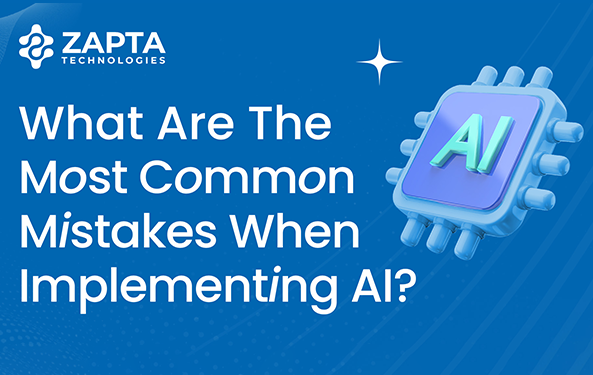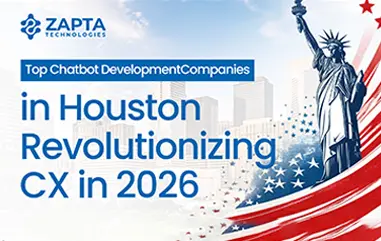Right now, slapping ‘AI-Powered’ on your business is the new corporate flex, even if there’s nothing under the hood.
And that’s the first mistake you make when implementing AI. Instead of focusing on strategy, data readiness, or real outcomes, businesses get caught up in the hype. The result? An AI pilot that never scales, a budget that quietly disappears, and a team left wondering what went wrong.
What are the Most Common Mistakes when Implementing AI?
In this blog, we’ll walk through the most common mistakes companies make when implementing AI and, more importantly, how you can skip the hype cycle and actually make it work. Because let’s be honest: you don’t want to be another company bragging about AI with nothing to show for it.
Let’s get straight to the first mistake.
Not defining a Clear Business Goal
One of the biggest mistakes you could make when implementing AI is treating the tech as the strategy. Before you bring in an AI tech to your business, you have to start with a clear, measurable business outcome. Because if you don’t, you’ll build features nobody needs, spend budget on low-impact automations, and ship a project that looks impressive on a slide but delivers zero value. Specifying your goal helps you measure success. Did the chatbot reduce ticket volumes? Did that AI-driven campaign improve conversions? Or are you just burning the budget because your competitors are doing “AI” too?
How to avoid it
Keep it simple:
- Start by asking: What problem is hurting us the most right now?
- Define one clear outcome: Do we want to cut support costs? Speed up order tracking? Improve upsell rates?
- Use AI only if it helps solve that problem better than your current process.
Stop treating AI as a trophy and give it a proper job to perform.
Poor Data Quality and Preparation
You’ve probably heard the phrase “garbage in, garbage out.” This phrase comes to life when you work with AI. If the data feeding your system is messy, incomplete, or biased, the results will be too. You might think AI can “fix” bad data. It can’t. If your customer records are duplicated, purchase histories are missing, or datasets are siloed in different departments, your AI will make decisions on flawed information. That means wrong predictions, poor personalization, and frustrated customers.
How to avoid it
- Prioritize data cleaning. Standardize formats, remove duplicates, and fill in gaps before AI ever touches the dataset.
- Integrate across systems. Break down silos so customer, sales, and operational data flow together for a complete picture.
- Build in governance. Establish rules for accuracy, privacy, and bias-checking so your AI keeps learning from trustworthy inputs.
AI is only as smart as the information you give it. If you want reliable results, start with reliable data.
Ignoring Scalability and Long-Term Maintenance
It’s tempting to treat AI as a one-off project: build it, launch it, done. But that mindset is where many businesses trip up. AI is high maintenance, and it requires your care. When companies rush to ship a “quick AI fix,” they rarely stop to think about what happens after launch. At first, the system might work fine. But as customer needs shift and new data flows in, the model slowly drifts away from accuracy.
The performance drops, errors creep in, and what once felt like a win becomes another headache. And because maintenance was never part of the plan, teams often face the expensive reality of rebuilding from scratch.
How to avoid it
- Design for growth. Choose tools and architectures that can handle larger datasets, more users, and evolving needs.
- Plan the upkeep. Set schedules for model retraining, performance monitoring, and version updates.
- Make it a team effort. Assign ownership across data, IT, and business teams so the AI keeps delivering value long after launch.
Overlooking Compliance, Privacy, and Security
In the race to adopt AI, compliance often gets pushed to the bottom of the checklist, until it’s too late. Regulations like GDPR, HIPAA, or even local data laws aren’t just legal fine print; they define how safely you can use customer data. When businesses skip compliance early on, they put themselves at risk of more than fines. A single data breach or violation can erode customer trust, damage brand reputation, and stall AI adoption altogether. And when it comes to industries like healthcare or finance, one misstep can even mean losing your license to operate.
How to avoid it
- Start with compliance, not after. Review relevant regulations before development begins.
- Embed security by design. Encrypt sensitive data, limit access, and build with privacy in mind.
- Audit regularly. Monitor systems for vulnerabilities and keep policies updated as laws evolve.
AI can’t create value if it puts your business at legal or ethical risk. Secure, compliant foundations set you up for credible and reliable success.
Underestimating Change Management
Even the smartest system won’t create impact if the people meant to use it resist adoption. Businesses invest heavily in the tech but forget to prepare the teams who’ll work with it every day. When employees aren’t trained or informed, AI feels less like support and more like a threat. Some worry about being replaced, others get frustrated with unfamiliar workflows, and without clear communication from leadership, confusion spreads quickly. Unrealistic expectations only make things worse: leaders expect instant ROI, while teams quietly revert to old methods. Before long, you’re left with a powerful system gathering dust.
How to avoid it
- Bring people in early. Involve key stakeholders during planning so they feel ownership, not surprise.
- Invest in training. Equip teams with the skills to use AI confidently, not cautiously.
- Roll out in phases. Set realistic timelines and goals so adoption feels manageable, not overwhelming.
AI succeeds when people succeed with it. Technology alone can’t drive change, but teams who know how to make the most out of it can.
Choosing the Wrong Team or Partner
The success of any AI project isn’t decided by the technology only; it also depends on the people building it. Too often, businesses pick whoever is easiest or cheapest: a freelancer here, an internal IT resource there. AI projects need more than just coding talent. They rely on clean data pipelines, domain expertise, and continuous support to stay effective. When businesses choose a partner who lacks that mix, things start to break down. Progress slows because the basics aren’t in place, results feel inconsistent, and fixes pile up faster than solutions. Eventually, the project stalls.
How to avoid it
- Match expertise to industry. Choose a partner who understands your sector’s challenges and regulations.
- Look beyond launch. Pick a team that offers ongoing support and iteration, not just a one-off build.
- Evaluate track record. Proven success in custom AI development is more reliable than promises.
The key takeaway here is: AI isn’t just about technology. It’s about strategy, people, and execution. Businesses that treat it as a quick badge of innovation risk wasting investment. Those that approach it with clear outcomes, strong data, and the right partners build systems that actually deliver value.
At ZAPTA Technologies, we’ve seen both sides of the story. That’s why our approach to custom AI development in the USA is built on collaboration: aligning solutions with your business goals, ensuring compliance from day one, and creating systems that scale as you grow. Whether it’s a first chatbot pilot or a full AI agent rollout, we help businesses not just adopt AI, but adopt it the right way. And if you want a partner who gets that, ZAPTA’s got you covered.

















